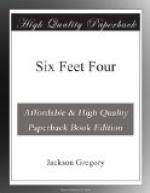Already the polka had come to its giddy end. Men and women, boys and girls, old folks with white hair and young folks in knee breeches and short skirts, laughing and talking crisscrossed the floor this way and that seeking seats. The girls and women sinking affectedly or plumping in matter-of-fact style down into their places, with languishing upward looks if they be young and in tune with the moon outside, with red faced jollity and much frankness of chatter if they were married and perhaps had a husband and children likewise disporting themselves, made long rows about the walls of the schoolhouse, looking for the world like orderly flocks of bright plumaged birds in their bravery of many hued calicos and ginghams; a gay display of bold reds and shy blues, of mellow yellows and soft pinks, with the fluttering of fans everywhere like little restless wings.
The men had left their partners, as custom demanded, and had gone to the doors, energetically mopping their brows with handkerchiefs as various in colour as the women’s dresses; red and yellow silk, blue and purple, and the eternal gaudy bandana. Thornton paused at the door, losing himself among the men who had come out to stand there smoking or to wander a little away in the darkness where earlier in the evening each had hidden his personal flask under his particular bush. There would be a good deal of drinking tonight, but then that too was custom, and there was no more danger here of drunkenness than in those more pretentious balls in town where men and women partake together of heady punch.
Thornton passed words of greeting with many of these men, ranchers for the most part whom he knew well. There was Bud King, his tie a vivid scarlet, his store clothes a blue-bird-blue, the wide silk handkerchief mopping his flushed face a rich yellow; there was Hank James from the Deer Creek outfit speeding away with long strides to his own bottle under his own bush where he might conceal the tremor of the new happiness he had but come from and drink to the big-eyed girl in the pink dress with the cascades of baby-ribbon; there was Ruf Ettinger with his new overalls turned back the regulation six inches from the bottoms in a cowboy cuff that permitted of the vision of six inches of grey trouser leg below; there was Chase Harper of Tres Pinos in the smallest boots man ever wore, with the highest heels, their newness a thing of which in their pride they shrieked manfully as he walked; and there was Ben Broderick, the miner, quietly dressed in black broadcloth, looking almost the man of the city. To him Thornton merely nodded, briefly, knowing the man but little, liking him less. But Broderick put out his hand, saying cordially:
“Hello, Buck. Going to shake a leg a little?”
“I might.” They were just outside the door, and the cowboy’s eyes running on past the miner sought up and down the lines of chatting women for the girl who had tempted him to his first dance in many months. He had seen Pollard’s team, but he had not seen Pollard or his niece. Broderick watched him, smiling a little. “Have a drink, Buck?” he asked, seeming not to have noticed the other’s curtness of word and manner. “I’ve got something prime outside.”




